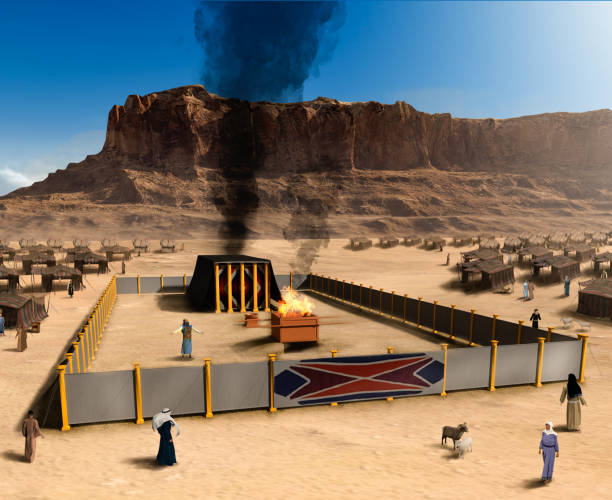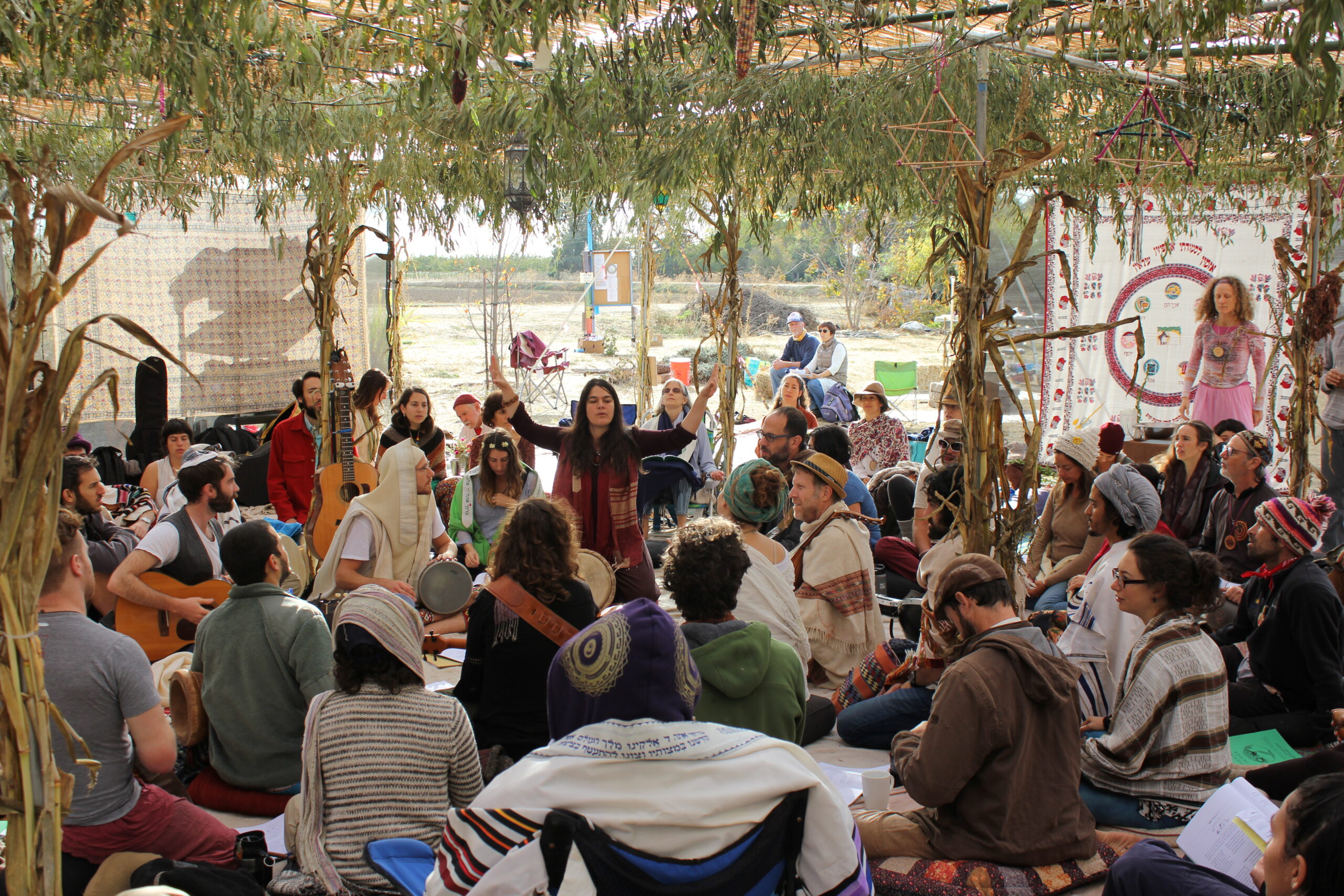The jewish festival that remembers camping in the desert is called sukkot. Sukkot is a week-long jewish festival that celebrates the harvest season and commemorates the 40-year period during which the israelites lived in the desert after being freed from slavery in egypt.
This holiday is also known as the feast of tabernacles or the feast of booths, and it is customary to build temporary shelters called sukkahs, which are decorated with fruits and vegetables. During this time, jews eat meals and even sleep in these sukkahs as a reminder of the israelites’ time in the wilderness.
Sukkot is a joyous occasion with several traditions, including the waving of the four species (palm, myrtle, willow, and citron), and it is one of the three major harvest festivals in judaism.

Credit: www.istockphoto.com
Introduction: The Jewish Festival Of Sukkot – A Celebration Of Desert Camping
Sukkot is a festival of great significance in jewish culture. This holiday is also known as the festival of booths or the feast of tabernacles. Sukkot falls in the autumn season, and it lasts for seven days. During this time, the jewish community builds temporary shelters outdoors decorated with fruits, vegetables, and flowers.
These are called sukkahs. The festival of sukkot is a celebration of the jewish community’s journey through the desert when they used to live in temporary booths.
Brief Overview Of Sukkot And Its Significance In Jewish Culture
- Celebrated in the month of tishrei according to the hebrew calendar, sukkot is one of the three pilgrimage festivals in judaism. During this time, jews come together from all over the world to celebrate.
- Sukkot commemorates the journey of the jewish community through the desert after their escape from egypt. It also marks the time when god provided food and shelter for them during their journey.
- This festival is considered a harvest festival and is a time of thanksgiving for the blessings of the harvest.
Explanation Of The Connection Between Sukkot And Desert Camping
- According to jewish tradition, the people of israel spent forty years traveling through the desert before they finally arrived in the land of israel. During this time, the israelites lived in temporary shelters called sukkahs.
- The sukkahs were made of natural materials such as branches, wood, and leaves. These were built to be portable so that the israelites could move and set up camp easily.
- The festival of sukkot is celebrated in memory of this time when the israelites lived in temporary shelters during their travels through the desert.
Highlight The Importance Of This Festival In Modern Times
- The festival of sukkot remains an important part of jewish culture and tradition to this day. It is still celebrated in much the same way as it was thousands of years ago. The temporary shelters are still built and decorated with fruits and vegetables.
- This festival is an important time for the jewish community to reflect on their history and their journey. It is also a time to show gratitude for the blessings of the harvest and to celebrate the joy of community.
- In modern times, sukkot has become a reminder of social justice and the importance of providing shelter and food for those in need. This festival encourages people to help others and to work towards a world where everyone has access to the basic necessities of life.
Sukkot is a time of celebration, reflection, and community. It is a festival that reminds jewish people all over the world of their rich history and traditions. This festival also encourages people to work towards a better world, one where everyone can enjoy the blessings of the harvest and the joy of community.
Discovering The Origins Of Sukkot And Its Meaning
The Historical Background Of Sukkot And Its Biblical Roots
Sukkot is a jewish holiday that dates back to biblical times. It is also known as the feast of tabernacles or booths and is celebrated in the fall, usually in late september or early october. Here are some key points about the historical background of sukkot and its biblical roots:
- Sukkot commemorates the time when the israelites lived in temporary shelters or booths (sukkot) while wandering in the desert for 40 years after their exodus from egypt.
- The temporary shelters were made of natural materials such as branches, leaves, and bamboo.
- God commanded the people to celebrate sukkot to remember their time in the wilderness and to thank him for providing for them during that time.
- Sukkot is also linked to the agricultural calendar, as it marks the end of the harvest season.
The Religious Significance Of Sukkot And Its Role In Jewish Customs
Sukkot is one of the most important holidays in the jewish calendar, and it is a time when families come together to celebrate and reflect. Here are some key points about the religious significance of sukkot and its role in jewish customs:
- Sukkot is a joyous holiday that symbolizes the jewish people’s dependence on god and their gratitude for his blessings and protection.
- During the holiday, jewish families build a sukkah, a temporary shelter decorated with fruits, vegetables, and other symbolic items.
- They will eat and sometimes even sleep in the sukkah, to remember their ancestors who lived in such shelters during their journey through the desert.
- The four species, or lulav and etrog, are also central to sukkot customs and are waved in a specific ritual during the week-long festival.
- Sukkot is one of the three pilgrimage festivals in judaism, when jews from all over the world used to travel to jerusalem to bring offerings to the temple. In modern times, many still make pilgrimages to jerusalem or participate in community celebrations.
Understanding The Symbolic Meaning Behind The Festival And Its Rituals
Sukkot is filled with symbolism and rituals that carry deep meaning for the jewish people. Here are some key points to understand the symbolic meaning behind the festival and its rituals:
- The sukkah represents the temporary dwellings the israelites lived in during their time in the desert, but it also symbolizes the fragility of life and how god can still provide for his people even in difficult situations.
- The four species also have symbolic meanings: The palm branch represents uprightness, the willow branch represents humility, the myrtle branch represents beauty, and the etrog represents the heart.
- Together, the four species signify the unity and diversity of the jewish people, reminding them to come together in harmony and peace.
- The shaking of the lulav and etrog in all directions is a prayer for god’s mercy and compassion on all corners of the earth.
- Sukkot is a time to reflect on gratitude, community, and hope, and to appreciate the blessings of the year while looking forward to the future.
The Experience Of Celebrating Sukkot In The Desert
Journeying To The Desert For Sukkot: The Preparations, Travel, And Settings
When it comes to celebrating sukkot, camping in the desert is a unique and exciting way to observe the holiday. The experience begins with preparations, which can include:
- Gathering camping gear such as tents, bedding, and cooking supplies
- Choosing a suitable location in the desert, which should be flat and free of rocks and debris
- Securing any necessary permits or permissions to camp in the area
Next comes the journey to the desert, which can be a thrilling adventure in itself. Consider these tips for travel:
- Check the weather conditions and prepare accordingly
- Bring plenty of water and snacks for the trip
- Have a reliable map or gps system to navigate to the campsite
Once you arrive at the campsite, it’s time to set up your temporary dwelling, or sukkah.
Creating And Decorating The Sukkah – The Temporary Dwelling For Sukkot
The sukkah is a key element of sukkot, representing the huts in which the israelites dwelled during their forty years in the desert. To create and decorate your sukkah:
- Build a simple structure using wooden posts or pvc pipes, and cover it with branches or bamboo
- Decorate the sukkah with festive ornaments such as painted gourds, fruit, and paper chains
- Hang strings of lights inside the sukkah for a cozy and inviting atmosphere
In addition to decorating the sukkah, there are several activities and traditions to partake in during sukkot while camping in the desert.
Partaking In The Activities And Traditions Of Sukkot While Camping In The Desert
Some popular activities and traditions to consider include:
- Eating meals in the sukkah, which should include foods with fresh, seasonal ingredients
- Shaking the lulav and etrog, a ritual in which a bundle of branches and a citron fruit are waved in six directions to symbolize god’s sovereignty over the universe
- Singing and dancing around the campfire, accompanied by traditional jewish music or guitar playing
Overall, celebrating sukkot while camping in the desert provides a unique and memorable way to connect with nature, tradition, and community. With careful planning and preparation, it can be an unforgettable experience for all involved.
Modern-Day Sukkot Celebrations And The Relevance Of Desert Camping
How Sukkot Is Celebrated In Modern Times And Across Different Communities
In modern times, sukkot is celebrated by jewish communities around the world, with each community adding its unique traditions and practices to the festival. Some common practices across different communities include:
- Building and decorating a sukkah, a temporary outdoor shelter with a roof made of branches, leaves, or other natural materials. The sukkah represents the temporary shelters used by the israelites during their 40-year journey through the desert.
- Eating meals and spending time in the sukkah with family and friends. Many people also sleep in the sukkah during the festival.
- Waving the lulav and etrog, a bundle of palm, willow, and myrtle branches along with a citrus fruit called an etrog, as a symbol of unity and gratitude.
- Singing and dancing, and hosting community events and dinners.
The Impact Of Desert Camping On The Sukkot Experience – How It Connects Us To Ancient Traditions And Practices
The practice of desert camping during sukkot connects us to the ancient traditions and practices of the israelites as they traveled through the desert. Some reasons why desert camping is significant in the sukkot experience include:
- It helps to create a feeling of solidarity with the israelites who were also traveling through the desert.
- It encourages people to experience the fragility of temporary shelter, reminding us of the importance of appreciating the present moment and the beauty of simplicity.
- It helps to cultivate empathy towards refugees and homeless people who live in temporary shelters or on the streets.
- It connects us with the natural world, as we are surrounded by the elements and the beauty of the outdoors.
- It provides an opportunity to disconnect from technology and distractions, allowing us to focus on spiritual and personal growth.
Overall, the practice of desert camping during sukkot encourages us to think about our place in the world, to appreciate the present moment, and to cultivate empathy towards others and the natural environment.
Frequently Asked Questions Of Which Jewish Festival Remembers Camping In The Desert
What Is The Jewish Festival That Remembers Camping In The Desert?
The jewish festival that remembers camping in the desert is sukkot.
Why Do Jews Build Temporary Shelters During Sukkot?
Jews build temporary shelters during sukkot to remember the israelites’ wandering in the desert.
How Is Sukkot Celebrated Today?
Sukkot is celebrated today by building and dwelling in a sukkah and by shaking the four species.
Conclusion
As we have seen, sukkot is the jewish festival that remembers camping in the desert. This fascinating holiday allows us to reconnect with our ancestors and the challenges they faced during their time in the wilderness. Sukkot not only reminds us of the hardships but also the blessings that were bestowed upon them during this significant period.
It is a time when we come together to celebrate the harvest and acknowledge the presence of the divine. The building of the sukkah, the waving of the four species, and the gathering of family and friends create a sense of community and oneness that is essential in judaism.
Overall, sukkot is a beautiful reminder of our shared history, the resilience of our people, and the importance of gratitude and togetherness. May this holiday continue to bring joy, blessings, and unity to all who celebrate it.




